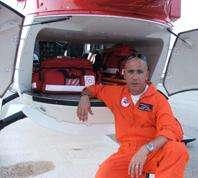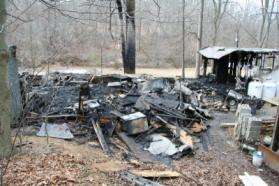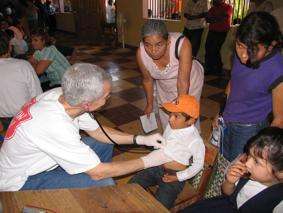At the end of last month, with fighting between Gaza and Israel already in full swing, Israeli medic Moshe "Moshon" Vaknin drove an ambulance to the Erez Crossing, between Israel and Gaza, and got ready to evacuate an injured Palestinian child.
With Israeli mortars fired on one side, and bullets passing overhead from the other, Vaknin, the deputy director for the south district at Magen David Adom (MDA), Israel's version of the Red Cross, risked his life to bring the Palestinian child out of Gaza and take him to an Israeli hospital for life-saving treatment.
Since then, he's brought out two more wounded Palestinian children for treatment in Israeli hospitals, and last week, was one of a team of medics who drove in to the checkpoint, the most dangerous in Israel and possibly the Middle East, in a special bulletproof ambulance to rescue Palestinian truck drivers, hired by the United Nations, and attacked while delivering humanitarian aid.
"It's unbelievably dangerous. It's crazy. The scariest place," says Vaknin, who took the injured truck drivers to Barzilai Hospital in Israel, and normally never goes so deep inside the checkpoint.
Vaknin doesn't look like a hero, but over the last four years in his job working for the MDA, he has helped bring thousands of sick and injured Palestinian children and adults from the Gaza strip to Israeli hospitals for vital medical care, often on a daily basis.
Even before the current conflict began, it was a dangerous job. So dangerous in fact his wife simply "doesn't want to know about it." Hamas sniper fire and rockets have been aimed many times at both Vaknin and the Palestinian patients he was transporting.
From Babies in Incubators to Seniors
"I really don't know why they were firing at us. They don't care, even if we were transporting a child or baby," says Vaknin, whose goal it is to save lives. "We don't choose who we treat. We take who there is," he told ISRAEL21c (abbreviated from Israel 21 century).
Vaknin is responsible for all the humanitarian efforts at the Erez checkpoint. "Every day, almost, we're taking injured and sick people to Israel through the Erez crossing," he says. "We have a coordinator in Gaza working with us. He will tell us if it's a baby in an incubator, a child, an adult, or an elderly person. It's pretty unpredictable, and I've stopped asking questions. Sometimes they will tell us to expect a five-year-old child. When we get to the crossing it's a one-month-old baby."
Each month, the MDA normally transfers about 120 Palestinians for care. "Taking the ICU car, we get to the border and walk down to the cement fence," he says. Palestinians can throw stones, Qessams or sniper fire at them, he says noting that the reaction is the same whether he is trying to rescue a child, an adult, or even a baby in an incubator.
Of course Vaknin has a special helmet and protective gear, but these things don't count for much when a rocket can land on you at any time, he says, explaining that much of the medics' work is done in the outlying fields surrounding Gaza, before they take the ICU-equipped ambulance to the hospital. The Israeli medics have to make sure the incubator is working, or that basics like blood pressure is stabilized and that the proper medications are delivered to the patient.
Family Under Rocket Fire Near Gaza
Meanwhile, Vaknin's wife doesn't really know the details about what her husband Moshe does every day. She prefers not to know, he says, while his four children ask questions and he answers. It's a bit strange, he admits, that living about a mile from the Gaza border in Kibbutz Yad Mordechai, he knows that he's treating the same people who are firing rockets on his family.
"They also live this reality of fear, because rockets are falling around us. We've learned to live like this. It's not a normal situation," says Vaknin, who is temporarily sick with a cold. "They're throwing rockets at my family and I am still helping them."
In the last week, the checkpoint has been closed, and the Palestinian coordinator has stopped calling. News reports suggest that the Palestinian Authority has reversed its long-standing policy and is now banning all medical transfers to Israel. Karin Kloosterman is a Canadian-Israeli freelance journalist reporting this story for ISRAEL21c, a non-profit educational foundation with a mission to focus media and public attention on the positive aspects of 21st century Israel.










Be the first to comment